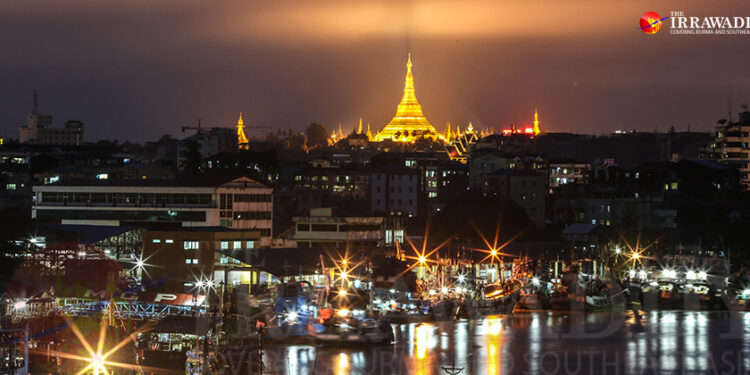The Yangon regional government has a tendency to annoy the Union government with its unrealistic plans and its disinclination to follow official procedures.
The latest embarrassment to Naypyitaw came two weeks ago in the form of the regional government’s budget proposal for fiscal 2019-20. The Yangon administration requested 16 billion kyats (about US$10.5 million) to construct a seven-story police headquarters with a helipad and a regional courthouse with two basements, and to purchase a 25-meter-long ferry to make trips to a remote island in the Andaman Sea.
Lawmakers in the Yangon parliament found it unacceptable to allocate such a large amount of funds while the city’s basic infrastructure needs—like building roads and upgrading the drainage system—go unmet. When the request hit the floor of the Yangon legislature, before being forwarded to the Finance Commission chaired by the Union President—it was rejected by more than one third of the 92 elected lawmakers, who deemed the projects “unnecessary.” During the debate, some wondered aloud about the fairness of the government spending so much on the projects while cutting budgets for regional development projects in their constituencies. Among the examples they cited was a proposed new road whose length had been halved.
“Instead of building what people really need, the government is spending a lot on others,” U Yan Shin, an NLD lawmaker, told the parliament.
But this parliamentary resistance couldn’t deter the Yangon government. U Myint Thaung, the region’s planning and finance minister, insisted the projects were necessary to promote the rule of law and fulfill the transportation needs of the people living on Coco Island. (For your reference, according to the 2014 National Census there are 950 residents on the island, which is 260 nautical miles—about 480 kilometers—from the city of Yangon.)
However, the minister’s reasoning didn’t impress President U Win Myint or the Finance Commission.
During the commission’s meeting on June 17, the President encouraged regional chief ministers to increase spending on regional development including road construction and electrification for the immediate benefit of the people.
On the following day in the Yangon parliament, to the delight of the lawmakers, Minister U Myint Thaung said the previously proposed 16 billion kyats would be used for regional development work instead of the police HQ, courthouse and ferry.
Yangon lawmakers viewed the President’s encouragement of regional development as an intervention—one that led to the sudden scrapping of 16 billion kyats worth of projects previously seen as must-haves.
It was not the first time a Yangon government plan prompted presidential intervention.
In October last year, the Yangon government jailed three journalists from Eleven Media Group after filing lawsuits accusing them of committing offenses against the state, after the organization published a story based on statistics contained in the chief auditor’s report and discussed by lawmakers in the regional parliament.
The arrests prompted the President to issue a directive ordering the regional government to follow the Media Law.
Article 22 of the law states that anyone who is not pleased with a media report should file an initial complaint with the Press Council. The law also requires complainants to deal with the issue in cooperation with the council. Only if the case is not addressed by the council should they bring the case to court.
Having failed to comply with the law, the Yangon government dropped the case and lodged a complaint with the council.
Were it not for the presidential interventions in both cases (and kudos should also go to the Yangon lawmakers involved in the budget debate), the outcomes would have been quite different: the three journalists would be behind bars and the city would be 16 billion kyats poorer.
It’s no exaggeration to say that the Yangon parliament is the most vibrant of Myanmar’s regional legislatures. Over the past three years, the lawmakers—the majority of whom are from the ruling National League for Democracy—have never disappointed their constituents, successfully reining in the unruly Yangon government, which has failed the city’s residents with its failed missions. Its revamp of the city’s bus system—initially highly praised—is still far from achieving its goals two years after its launch. A night market that was opened on the city’s Strand Road in 2017 with a 1.8-billion-kyat investment from the government stands deserted. The recent request for 16 billion kyats for three non-essential projects offers further proof of its ability to find ways to waste money.
It’s also worth remembering that, much to the National League for Democracy-led government’s embarrassment, Yangon Region Chief Minister U Phyo Min Thein remarked in 2017 that there are “no civil-military relations in the democratic era” and that the position of the military’s commander-in-chief “is the same as the level of director-general, according to the [state] protocol.” This attracted the ire of the country’s powerful military, which filed a complaint with the government asking it to take necessary actions against him, saying that the chief minister was not suitable for “constructive, long-term relations” with the army and that his confrontational comments about the military chief were an “insult.” On the orders of the President’s Office, the chief minister sent an apology to the military.
If this pattern continues, the Yangon government, especially Chief Minister U Phyo Min Thein, will become a source of annoyance not only to voters but also to lawmakers. It must be dismaying for the President to have such a wayward subordinate. Most unfortunate of all are Yangon’s more than 7 million residents, whose lives are immediately affected by every decision he makes. Keep your fingers crossed, folks!
You may also like these stories:
Govt to Spend Record 3 Billion Kyats on Medical Research Next Fiscal Year
Business Environment Index Shows Transparency a Major Challenge to SME Growth
‘Other Accounts’ of Union Govt Ministries, Agencies to Be Scrapped
Yangon Govt Drops $10 Million Spending Proposals

















